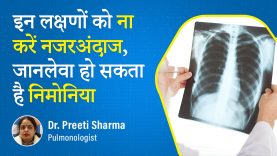Pneumonia Signs and Symptoms | निमोनिया के लक्षण, कब जाये डॉक्टर के पास | निमोनिया की पहचान कैसे करें?
- 74.32K
- 3 years ago
Dr. Preeti Sharma
Dr. Preeti Sharma
Pneumonia Signs and Symptoms | निमोनिया में क्या क्या दिक्कत होती है?
In this video, SimpliHealth expert Pulmonologist, Dr. Preeti Sharma is talking about Pneumonia(निमोनिया,) and also she is answering some questions that people usually ask like:Pneumonia Signs and Symptoms
- What is pneumonia?
- What are the symptoms of pneumonia?
- How can we diagnose it?
- What are its treatment procedures?
What is pneumonia(निमोनिया)?
Pneumonia(निमोनिया) is one of the lung infections. Usually, it is the air sacks or the tubes that aid in the inhalation process and extend up to the lungs, which are generally filled with air. In pneumonia, these tubes get filled with fluid or pus, resulting in problems in inhalation. Many reasons contribute to this condition, for example, bacteria, viruses, and fungi. They may cause pneumonia.
What are the risk factors associated with pneumonia? And Who is more prone to this disease?
The majority is found in children and the old age group. Those who have compromised immunity, for example, diabetic patients or patients with a kidney-associated disease who often are on dialysis, HIV compromised patients or people who have taken medicines that result in immunosuppression like Rheumatoid arthritis and Crohn’s disease. The chances of suffering from pneumonia increase with compromised immunity.
What are the symptoms of pneumonia? / निमोनिया के लक्षण
The occurrence of intense fever, pain in the chest, heavy breathing. Apart from this, coughing with phlegm or blood is a few symptoms of pneumonia. When are these considered a danger sign? When you have an intense fever or high-grade fever of more than 101 degrees, and it is not coming down from 2-3 days, the average inhalation process, which usually stays in 18 to 20, increases sharply.
In addition, there is swelling of tubes while inhalation, more commonly called chest indrawing in children. These are some common symptoms observed in pneumonia. If any of these symptoms cause mental confusion, there are some dangerous signs of pneumonia. If you see any of these symptoms, you must visit your doctor immediately and start the treatment.
How does pneumonia progress?
It occurs in stages. There are four stages of pneumonia. Initially, there is a stage of congestion, when we acquire bacteria and the infection goes into the lungs, there is congestion in which water is filled in air sacks, as I told you earlier. After this comes stage 2, called Red hepatization, where many cells like RBCs and macrophages start accumulating, this Stage 2 comes after one day in 2 to 3 days.
After this comes the 3rd stage, Grey hepatization, in which the healing process starts and lasts for 4-6 days. The fourth stage is the resolution stage, which comes 8 to 10 days after the treatment. These changes initiate gradually in the lungs, and we start breathing normally. These are some stages of pneumonia.
How to diagnose pneumonia? | Pneumonia Signs and Symptoms
First, experts take the history based on symptoms. Then, when a patient comes, the doctor checks its vitals. As I told you before, intense fever increases the rate of respiration, and sometimes some may have low BP, and in some, there is an increase in urea levels. Apart from this, experts do an X-Ray in which experts see the extent of lung infection and how much the lobes are infected. Then, there are some blood tests performed to identify different germs.
Pneumonia Treatment / निमोनिया के इलाज
When a patient comes to us, experts may prescribe them antibiotics. It may vary in people. It may go from mild to severe among people. If it’s mild pneumonia, the doctor treats it on an OPD basis by prescribing antibiotics for five days. After that, the patient may go to his home, take medicine, and come for follow-up.
In some patients, like when we talk about some significant signs based on those danger signs, the doctor needs to admit the patient in the hospital inward or ICU depending upon the patient vitals, and they are given intravenous IV broad-spectrum antibiotics, notably amoxicillin based groups, along with macrolides combination. The doctor needs to provide these medicines for at least 7 to 10 days to get early healed and discharged as per the vitals. If pneumonia is identified timely and the patient comes to the doctor in time, it doesn’t worsen. And experts can treat it. The survival rate is good. But if the patient has mild pneumonia or has come to the doctor within time, it can be treated adequately.
Some bacteria are antibiotic-resistant, or in some people, as I told you before, who have compromised immunity have a chance of having severe pneumonia. The patient may stay in ICU for longer or may reach a ventilator. Those people take more time to heal, and it may take a dangerous turn or may get life-threatening. So I wish its prevention especially in children as our experts said that it is widespread in children.
We have a complete immunization schedule specific for children to prevent different germs related to infections. Must follow this immunization schedule. Keep the nutrition of children in mind. Adequate nutrition is very much necessary. Avoid crowded places. By following these small things, we can prevent this infection, and if you have any symptoms, immediately visit and consult the doctor and get the necessary treatment.
Thank you















Comments (0)